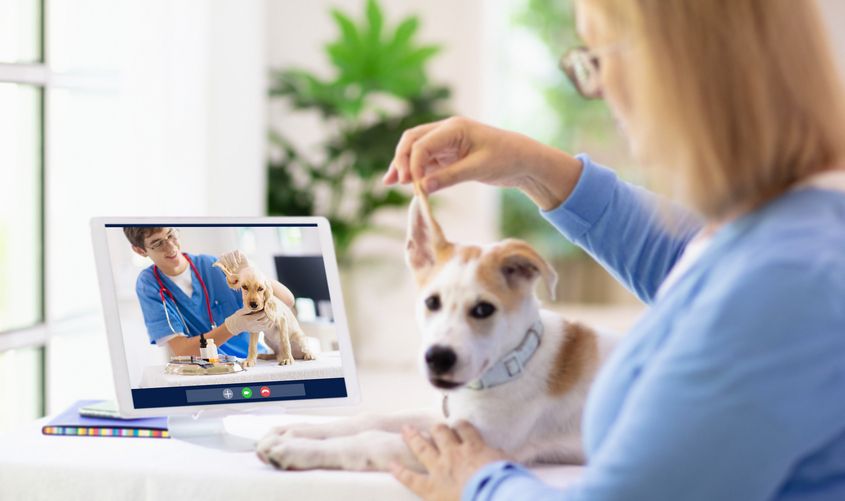
At the heart of any relationship, including doctor-to-patient, and whether that patient is human or animal, is good communication.
Dr. Lauren Nicki Wise, assistant dean of fourth-year clinical training for the School of Veterinary Medicine and professor in the Department of Large Animal Medicine and Surgery, explained why it is important that vet students receive ample training and preparation of effective client communication skills, including a focus on the growing practice of telehealth within vet medicine.
St. George’s University: How are communication topics taught to vet students?

Dr. Lauren Nicki Wise: Students are required to take client communication labs as part of SVM’s Professional Development Curriculum, which is a set of six courses that occur in Terms 1-6. The curriculum focuses on the “non-technical competencies” that successful veterinarian’s practice on a daily basis. These competencies include, but are not limited to:
- leadership
- communication
- ethics
- wellness
- business/financial literacy
- evidence-based practice
Part of the communication curriculum includes laboratory sessions where students practice client communication with simulated clients (SCs), or actors who have been trained extensively to fill this role in the curriculum. Through these simulations, students gain invaluable experience before being placed into a real exam room with a real client. These labs are mandatory and occur in Terms 5 and 6.
SGU: How did the curriculum translate to virtual learning once the pandemic hit?
Dr. Wise: Before COVID, these labs occurred in person but when the pandemic forced campus closure, we adapted the labs to an online format over Zoom. Working with our collaborators in the Washington State University CVM Clinical Communication Program, for the Fall 2020 term we have altered these labs to focus on telehealth and the role that this plays in the lives of veterinarians all over the world due to the pandemic. Aside from the SCs, the labs are team taught by SVM faculty who are passionate about this topic and have been trained to coach the students through these experiences.
SGU: Do the labs include both small and large animal cases?
Dr. Wise: For the Fall 2020 term we only focused on small animal cases, but for the Spring 2021 term we will be adding large animal as well. But the beauty of communication skills is that it really has nothing to do with the species or the details of the case. You can connect with your client in the same way, using the same skills, whether you are examining a kitten or a chicken.
SGU: What are the key takeaways that students should know after taking the course?
Dr. Wise: First, it is important that students realize these skills are learned just like learning to spay a dog. You are not born being a good communicator. It takes work and practice—yet mastering these skills is extremely important to be a successful veterinarian.
Secondly, everyone’s communication style is different. It takes lots of practice to find what works for you and your clients. And these labs give them the tools and experience to continue their growth in clinical year and once in practice.
SGU: Why is telemedicine is an increasingly important practice in vet medicine?
Dr. Wise: The pandemic has created a situation where many veterinarians are reducing their contact with the public to protect themselves and their staff. As such, many client interactions are being done over the phone or on Zoom. We felt it was very important to use these labs as a platform for students to be exposed to this type of communication since many of them will likely need to feel comfortable with it in the future.
SGU: Why will it be important for students to know these skills as they enter their careers?
Dr. Wise: Being able to effectively communicate with your clients is one of the main skills that most veterinarians will use on a daily basis. Research shows us that effective communication reduces client complaints, increases client compliance (which results in healthier pets), and enhances veterinary job satisfaction (and thus wellness).
– Laurie Chartorynsky

